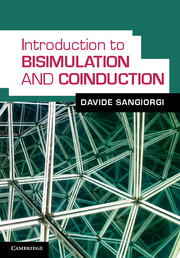Book contents
- Frontmatter
- Contents
- List of illustrations
- Preface
- General introduction
- 1 Towards bisimulation
- 2 Coinduction and the duality with induction
- 3 Algebraic properties of bisimilarity
- 4 Processes with internal activities
- 5 Other approaches to behavioural equivalences
- 6 Refinements of simulation
- 7 Basic observables
- Appendix A Solutions to selected exercises
- List of notation
- References
- Index
1 - Towards bisimulation
Published online by Cambridge University Press: 05 August 2012
- Frontmatter
- Contents
- List of illustrations
- Preface
- General introduction
- 1 Towards bisimulation
- 2 Coinduction and the duality with induction
- 3 Algebraic properties of bisimilarity
- 4 Processes with internal activities
- 5 Other approaches to behavioural equivalences
- 6 Refinements of simulation
- 7 Basic observables
- Appendix A Solutions to selected exercises
- List of notation
- References
- Index
Summary
We introduce bisimulation and coinduction roughly following the way that led to their discovery in Computer Science. Thus the general topic is the semantics of concurrent languages (or systems), in which several activities, the processes, may run concurrently. Central questions are: what is, mathematically, a process? And what does it mean that two processes are ‘equal’? We seek notions of process and process equality that are both mathematically and practically interesting. For instance, the notions should be amenable to effective techniques for proving equalities, and the equalities themselves should be justifiable, according to the way processes are used.
We hope that the reader will find this way of proceeding helpful for understanding the meaning of bisimulation and coinduction. The emphasis on processes is also justified by the fact that concurrency remains today the main application area for bisimulation and coinduction.
We compare processes and functions in Section 1.1. We will see that processes do not fit the input/output schema of functions. A process has an interactive behaviour, and it is essential to take this into account. We formalise the idea of behaviour in Section 1.2 via labelled transition systems (LTSs), together with notations and terminology for them. We discuss the issue of equality between behaviours in Section 1.3. We first try to re-use notions of equality from Graph Theory and Automata Theory. The failure of these attempts leads us to proposing bisimilarity, in Section 1.4. We introduce the reader to the bisimulation proof method through a number of examples.
- Type
- Chapter
- Information
- Introduction to Bisimulation and Coinduction , pp. 11 - 27Publisher: Cambridge University PressPrint publication year: 2011



